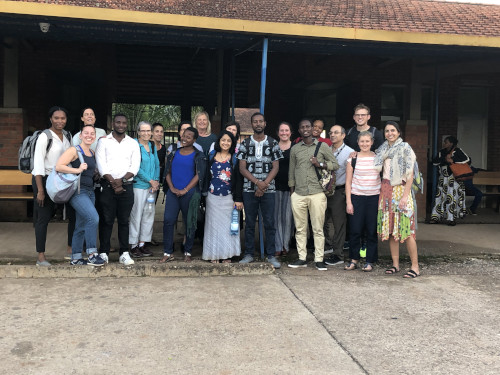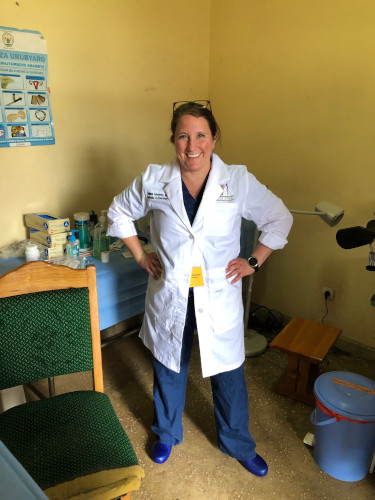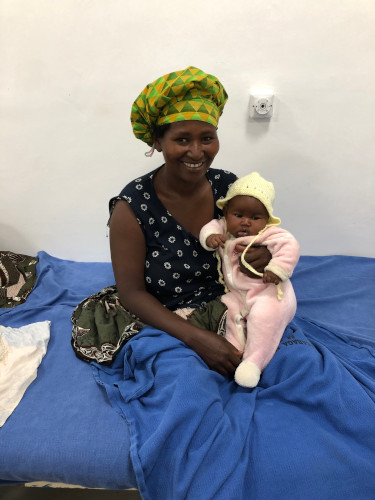
A desire to help women regain a sense of normalcy led Melinda Abernethy, MD, MPH to donate her time and surgical skills to a medical mission in Africa.
Dr. Abernethy, an associate professor in the medical school’s Department of Obstetrics and Gynecology specializing in female pelvic medicine and reconstructive surgery, spent two weeks in Kigali, Rwanda in October fixing vaginal fistulas in women who had traveled up to 14 hours for the surgeries.
Dr. Abernethy said her trip was inspired a medical mission trip she took in medical school to Malawi for HIV and AIDS research and a month-long medical mission trip in Ghana during residency doing OB-GYN and fistula work.
“Part of the reason I went into urogynecology is to do this kind of work,” Dr. Abernethy said. “It was the month I spent in Ghana that led me to practice urogynecology because of the ability to help women in the United States with pelvic floor disorders and also to contribute to improving the huge issue with obstetric fistula in the developing world.”

Dr. Abernethy said the gynecological needs of women in every country are different, but women in developing countries live a long way from any birthing providers. By the time they reach a provider or a hospital they may have been in labor with complications for days. Those complications can lead to tissue breakdown and fistula, she said.
Within hospitals in developing countries, many providers are not proficient in their surgical skills, which can lead to high rates of complications following cesarean sections and post-delivery hysterectomies, Dr. Abernethy said.
“Part of our goal is to not only perform corrective surgeries for women with urogenital fistulas but also to help teach surgical techniques to the local surgeons and trainees,” Dr. Abernethy said.
Dr. Abernethy traveled to Rwanda with others as part of the International Organization of Women and Development, a non-profit organization that participates in outcomes-based research and that provides free specialized surgery and care to women in low-income countries.
“It was rewarding to realize how quickly you can change someone’s life there,” Dr. Abernethy said. “For these women who just poured out urine all the time and were ostracized from their communities, after surgery were able to reengage with their families and communities and re-enter the workforce. It’s amazing how one surgery could give someone their life back.”
In developing world fistulas are predominantly obstetric related, while in the United States they’re more likely to be iatrogenic – caused by treatment, such as complications following pelvic or gynecologic surgery, Dr. Abernethy said. A fistula is an abnormal connection between two organs. Vaginal fistulas can cause women to continuously seep urine or stool without any way to control it.

The IOWD hosts trips three times a year where providers bring their own supplies and pay for their travel. Each trip includes anesthesiologists, nurse anesthetists, urogynecologists, nursing staff and OB-GYNs who volunteer their time and help train residents and medical students to perform cesarean sections safely. The group also includes an engineer who sets up equipment to ensure the providers can perform the surgeries.
Radio announcements advertise the trips to women who may need help, and women travel from up to 14 hours away on buses, often with their babies. They live for weeks with other women in tents set up by the IOWD, and the organization provides meals for the women. The women are evaluated, have surgery and stay about two weeks after surgery, often helping each other care for their children.
“They develop a little community,” Dr. Abernethy said. “It’s wonderful to see.”
Dr. Abernethy said she plans to volunteer for the medical mission each year, thanks to a supportive family and work environment that allows her the time to be away.
“I have the resources to help people that don’t and that’s important and also fun,” Dr. Abernethy said. “I get to operate with other urogynecologists around the country which improves my surgical skills. I help a very at-need population and it’s rewarding and gives perspective. The minor frustrations we feel here seem small compared to what so many people deal with in developing countries.”
